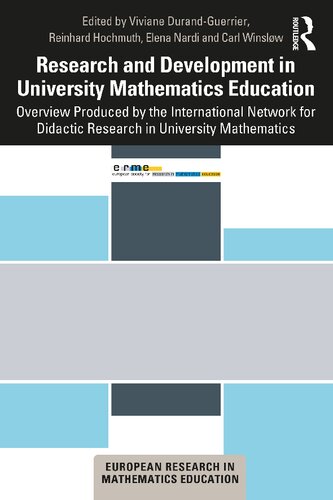

Most ebook files are in PDF format, so you can easily read them using various software such as Foxit Reader or directly on the Google Chrome browser.
Some ebook files are released by publishers in other formats such as .awz, .mobi, .epub, .fb2, etc. You may need to install specific software to read these formats on mobile/PC, such as Calibre.
Please read the tutorial at this link: https://ebookbell.com/faq
We offer FREE conversion to the popular formats you request; however, this may take some time. Therefore, right after payment, please email us, and we will try to provide the service as quickly as possible.
For some exceptional file formats or broken links (if any), please refrain from opening any disputes. Instead, email us first, and we will try to assist within a maximum of 6 hours.
EbookBell Team

5.0
68 reviewsIn the last thirty years or so, the need to address the challenges of teaching and learning mathematics at university level has become increasingly appreciated by university mathematics teachers, and beyond, by educational institutions around the world. Indeed, mathematics is both a condition and an obstacle to success for students in many educational programmes vital to the 21st century knowledge society, for example in pure and applied mathematics, engineering, natural sciences, technology, economics, finance, management and so on. This breadth of impact of mathematics implies the urgency of developing research in university mathematics education, and of sharing results of this research widely. This book provides a bespoke opportunity for an international audience of researchers in didactics of mathematics, mathematicians and any teacher or researcher with an interest in this area to be informed about state-of-the-art developments and to heed future research agendas.
This book emerged from the activities of the research project INDRUM (acronym for International Network for Didactic Research in University Mathematics), which aims to contribute to the development of research in didactics of mathematics at all levels of tertiary education, with a particular concern for the development of early-career researchers in the field and for dialogue with university mathematicians.
The aim of the book is to provide a deep synthesis of the research field as it appears through two INDRUM conferences organised in 2016 and 2018. It is an original contribution which highlights key research perspectives, addresses seminal theoretical and methodological issues and reports substantial results concerning the teaching and learning of mathematics at university level, including the teaching and learning of specific topics in advanced mathematics across a wide range of university programmes.